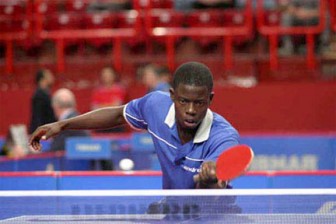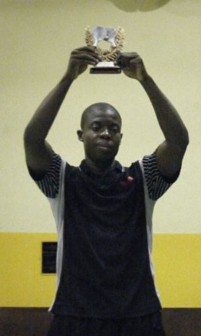Idi Lewis is an exceptional table tennis player. A southpaw, Lewis has the unique distinction of winning the Caribbean junior boys singles title and reaching the semi-finals of the men’s competition. His feats will undoubtedly place him in table tennis’s Hall-of-Fame alongside such great players as George Braithwaite, Sydney Christophe, Balkisson, Errol Caetano, Carol Davidson, Claire and Margurite Harris and a number of other great players this country has produced when the time comes.
In the meantime though, Lewis is fast carving out a career as a coach extraordinaire.
While a number of players have won either the men’s, women’s or junior singles titles not have won both and in fact only carol Davidson has won two women singles titles.

Balkisson (only name) has won the junior title and was the runner up in the senior division while Lewis also won the junior title and placed third in the senior category.
Of Lewis’s feat, one might be tempted to argue that Balkissson did better but while Balikissson must be lauded for his achievement – and one wonders why the government has not seen it fit to honour this great sportsmen while he is still alive, the one distinction between the feats of Lewis and Balkissson is that Lewis played at a time when the Spanish-speaking countries ruled and continue to rule Caribbean table tennis. When Balkissoon played there were no Mario Alvarez, No Reymundo Fermin, no Juan Vila, all Caribbean men’s singles champions who admittedly, played before Lewis’s time as well but the point here is to show the Dominican Republic’s domination of the sport since their entry.
The influx of Spanish-speaking racquet wielders from Venezuela (remember Elizabeth Popper) and Cuba, (remember Raul Bettancourt) has prevented the English-speaking Caribbean players of winning much hardware. So it was then, so it is now and any medal won in this day and age must be saluted, heralded. It is for this reason that Guyana’s lone medal, a silver in the girls Under-15 category of the recent Caribbean Table Tennis Federation Cadet and Junior championships in Cuba, must be seen in its proper context.

And though the medal was won by Chelsea Edgill, it is Edghill’s coach, Lewis, who must also share in the accolades. He has distinguished himself as a player at the regional level and now in the twilight of his career, bypassed for selection by the partisan politics of the Guyana Table Tennis Association, Lewis, magnanimously continues nonetheless, to give back to Guyana’s table tennis, proving that his heart is not only big on the table but off it as well.
Recently, a passionate Lewis spoke of his sojurn as coach of the national team at the CRTTF Cadet and Junior championships in Cuba. The championships, as stated before were completely dominated by the Spanish-speaking teams of Cuba and the Dominican Republic, says Lewis, adding that players from the two countries were in at least 95 per cent of the finals.
“They were in maybe 95 per cent of the finals, teams, singles right through.
They completely dominated the tournament,” he told Stabroek Sport in the exclusive interview.
“I think the standard of play was extremely high from the Spanish-speaking counterparts, the Cubans and Dominican Republic players and, if you check the results, players from those two countries reached most of the finals….. everything was Cuba and Dom Rep (Santo Domingo) besides the Under-15 with Chelsea (Edghill) and Trinidad, who got bronze medals in the boys teams and the boys doubles. I think Jamaica might have gotten a bronze in the women but I’m not too sure about that.” Lewis said the players from those two countries were a cut above the opposition adding that there is a big gap between the Spanish-speaking countries and most of the English counterparts. The reason for that gap, Lewis said, in his opinion was the preparation. “The reason is the preparation. That’s the main reason. The way they train. I spoke to Juan Vila, president of the Dominican Republic team and a former Caribbean men’s singles champion and he told me that they train for five hours a day, six days a week,” said Lewis.
“If any player does not want to commit to that type of training then there’s no chance they will be on the team.
“Added to that, they are also on the International Circuit where they are playing all these ITTF sanctioned tournaments,” he revealed.
Lewis said the Dominican Republic team came to the tournament with trophies and medals they had won in a tournament in Venezuela.
“They came straight from Venezuela to Cuba. Also, some of the girls had participated at the World Junior Championships in Germany, just to give you an idea of what their preparation was like and what we were up against.”
Waste of resources
Asked whether given the above, future participation at such tournaments was not just a waste of resources, Lewis said no.
”I won’t necessarily say it’s a waste of resources. We need to look at our preparation. I think that’s one of the main reasons why our team did not do so well because of the preparation. When it comes to preparation there’s no structure.”
Lewis acknowledges, though, that it would be difficult for local players to train for five hours a day given school and other commitments but said he feels that there are alternatives.
“Yeah! Definitely! We used to do it. Not five hours a day, but in the afternoons you could play for two hours. I mean, you’re not going to these games mainly to participate, to compete, if you’re serious about winning medals, then you’ve got to have a better structure as far as training and the preparation of the team is concerned.”
Despite the fact that the Spanish-speaking players were obviously stronger, tactically superior and better prepared, Lewis said that he would have loved to see a bit more fight from some of the local players especially in the team events. “If you look at the players that actually did well for Guyana the results will show, the results don’t lie because our players were already at a disadvantage since the opposing players were way more prepared and had a lot of international tournaments under their belt whereas our players were just here, they go out one time a year.
“Apart from the players from the Malteenoes Club, who went out to Trinidad recently, everybody else was just at home.”
Lewis said as far as he is aware, the local players were not at a disadvantage equipment-wise, with respect to the rules especially those pertaining to the serve.
Way Forward
If the GTTA is to have success at future such tournaments Lewis opines that there are at least two things the association needs to do to improve their fortunes one is improve the present infrastructure and secondly start preparation much earlier.
”Two things. first, you’ve got to select the team early at least three months in advance before the games and you’ve got to let them start training together as a team even if it’s just three or four times a week for two-and-a-half or three hours a day.
“Second, you’ve got to start exposing players, start getting them out, all the other countries are doing it. At the end of the day, you get back what you put in, so if their training is mediocre, that’s the results you will get.”





